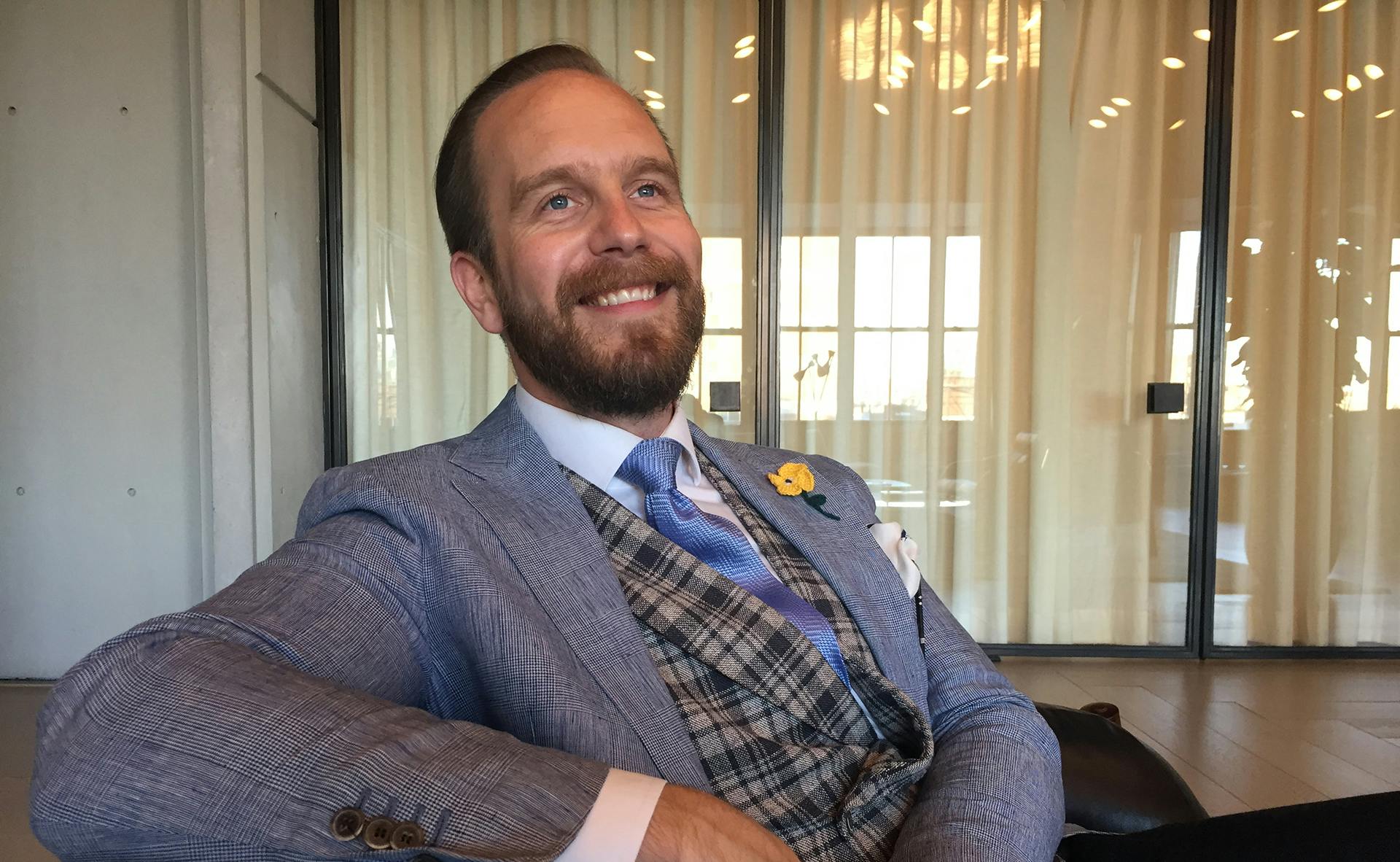If you know anything about being a gamer, you can see how the trajectory of Jan Roessner’s career inevitably led him to where he is right now. He’s the cofounder of One Earth Rising, a New York–based video game development company with a unique focus on social impact.
Roessner started his career leading operations in the German military’s helicopter squadron (a job that requires a lot of hand-eye coordination). After his service was completed, he founded the digital marketing firm Sagency, which began in Berlin and expanded to New York. The animal-rights organization PETA hired his company to find a way to educate a wider audience, and Roessner saw the opportunity to do something he’d been wanting to do for a long time: make a video game.
He partnered with the artist and game designer Luc Bernard, and together they created Kitten Squad for the PlayStation 4. The fast-paced action-adventure shooter put players in the role of a heavily armed kitten tasked with fighting hordes of robots to save animals from captivity and abuse. Each mission also provided players with real-life insight into the horrors of captive animals through graphic novel–like animations. This was one of the first times a console game had been created for a nonprofit, and Kitten Squad proved to be such a hit that it surpassed over two million downloads in its first year on the market.
Following the success of the game, Roessner and Bernard cofounded Arcade Distillery, a game development and publishing platform. Shortly after, he began to focus on One Earth Rising, one of the first companies in the video game industry to be founded as a public-benefit corporation—a for-profit company required to fulfill the public benefits incorporated into its charter; One Earth Rising's B Corp application is currently in process. Roessner spoke with Overture about his career, his inspiration, and what he hopes to achieve in gaming.
How did you get the idea of using video games as a way to raise awareness?
Many movies and television shows, especially documentaries, have helped change public opinion. For me, video games have always been the next logical progression of that. Especially console games, where you have to consciously sit in front of a TV and dedicate time to playing. Whatever you sit down to watch creates memories and emotions. But even with the most beautiful documentary, you’re still just a spectator. With the game, you become an actor. All your decisions matter. You connect much more deeply with the characters, with the story, and as a result, with the message it’s all delivering. And it sticks.
Where did the name "One Earth Rising" come from?
We were struck by images of what the earth looks like from the moon. Really, from that vantage point, it clarifies that all the problems we have on the planet are shared by all of us. We’re one earth. We have to get together and face the problems we all have as a collective, even if it’s just by playing games and having fun.
I saw Kitten Squad has been referred to as an “advocacy game.” How do you generally approach the titles you’re developing for One Earth Rising? Do you lead with the social message or have it be secondary?
If you look at the market, we are not the only company creating games for social good. There are a couple of other [companies] that have done this before, many of them for the PC and mobile markets. But what we do differently is we take the approach that it has to be a good game first. It needs to be a game that’s fun to play—that players want to engage with no matter what it’s about. Even if they don’t care about the social message or the organization it’s supporting.
It’s really for everyone who works with us—all the nonprofits—they have to understand that if nobody wants to play the game, it’s pointless. You might know in the video game industry—if you call something an "educational game," it’s almost like a swear word. You don’t want it to be perceived like that, because already it can be perceived as boring. Even though creating social impact is the main reason for the work we do, we have to focus on creating fun games that happen to have an educational message conveyed by the characters you become attached to, by the story, by the themes.
One Earth Rising is structured as a public benefit corporation. How do the games actually benefit nonprofits or make a social impact?
Paraiso Island is our first game, currently available on PlayStation 4, and it’s dedicated to aiding disaster relief efforts. It’s an outlier in how we would normally develop a game like this. We created the game first but are just now bringing the nonprofit partners on board—the first one being All Hands & Hearts. We’re actually sharing a minimum of 30 percent of our profits from the game with them. And [we] will do the same in the future with other nonprofits that we partner with. Each one will be the revenue recipient for a specified amount of time.
And this is the model we seek to follow with our future releases. We’re currently developing an ocean protection game, an anti-bullying game, and a few other concepts that would benefit marine conservation and anti-bullying organizations. The nonprofits we partner with will get three benefits. One, their name will be included in the game, the mission and cause they stand for will be implemented into the game in a nonintrusive way, and of course, we will donate a portion of our profits to them during the specific amount of time they are engaged or, in some cases, for the lifetime of the game.
Our primary goal is to create sustainable revenue for nonprofits through gaming.
Is it hard to convince nonprofits this is a worthwhile partnership?
In the beginning—that is directly after Kitten Squad and before One Earth Rising—we struggled to find any other nonprofit that wanted to work with us. With nonprofits, they also have to convince their donor base that this is worthwhile. Because they will probably ask, “Why would we build a game instead of wells in Africa, or, you know, protect the ocean?” So, it was a hard sell, and it was a steep learning curve for us to learn what the obstacles are. Our focus now is to find partners that work with us on the financing of the games, or we finance the games ourselves. As a result, we can offer free funds and awareness to the nonprofits. Most nonprofits would say yes to that, but some vary in respect to the gaming topic. In general, it is easier to work with nonprofit leadership teams that understand or are interested in entertainment. Video games are the fastest-growing entertainment industry in the entire world.
Do you see social impact video games becoming a trend? How do you think this will affect the nonprofit and video game industries in the future?
I think, especially for millennials and people in Gen Z, everybody wants to get into the social impact space. Everybody wants to support a cause and give back, and expects companies to do the same. But if we're looking at the methods of how to support nonprofits—they haven't really changed in over a hundred years. There’s still a focus on holding out a tin cup to the big donors and trying to get donations wherever they can. There are digital donation models now, but it is still only a fraction of revenue for nonprofits. So, there is a real opportunity with the digital native generations to change that system by allowing people to actively participate and do good through gaming. That is the best-selling argument to parents too. “No, Mom, I really have to play this. I'm saving the world right now.” We are focused on creating games that change what it means to give back and support charity, and I think that will make massive changes in the way nonprofits raise money.











